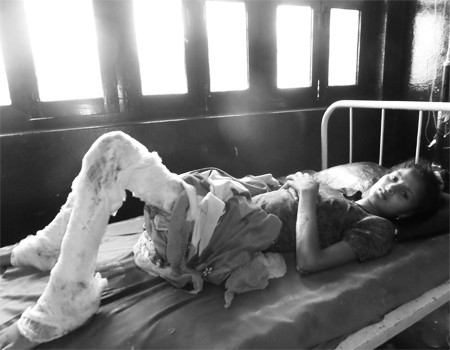Nepalese Husband Farid Sheikh 'Set Pregnant Wife on Fire' Over Dowry

A Nepalese man allegedly set his pregnant wife on fire in a demand for dowry, according to local officers and a rights group.
Farid Sheikh and his parents have been accused by police of spilling kerosene over the woman, who was seven months pregnant, in an attempt to obtain by force a motorbike and a water buffalo from her family.
The victim, 25-year-old Rihana Sheikh Dhafali of Miyapur, was taken to Bahraich in India for treatment. "When the incident happened about a month ago, they took her to India for treatment, saying it was an accident," a police official told AFP. But her health worsened and she had a miscarriage on 24 April.
The husband's family left her after her Rihana's father rushed to India after learning about the incident. The woman's father then filed a criminal case against Farid Sheikh's family in Banke district, Nepal. "We recorded her statement yesterday, but her husband and in-laws have vanished. We are searching for them," the policeman told AFP
Local human rights group Informal Sector Service Centre said in a statement that the burnt woman had been sent to Kathmandu for further treatment. She remains in critical condition, with her entire lower body wrapped in bandages.
"According to the victim, her husband assaulted her regularly saying that she did not bring motorbike, buffalo and other things as dowry," the group said, citing the woman. "She added that he burnt her private parts with cigarette, saying that they set fire on her by sprinkling kerosene over her after tying her hands behind."
Dowry-related violence is still a problem in Nepalese Hindu society.
When a girl is between 16-21 years old, her parents arrange a marriage for her. Once married, the girl leaves everything behind and is be able to see her family only once a year. Her life becomes entirely dependant on her husband and his extended family. Dowries place a huge financial burden on poor families.
Nepalese activists have long called for tougher sanctions against assailants of dowry-related violence. The tradition is widely practised in Nepal and India.
© Copyright IBTimes 2025. All rights reserved.






















